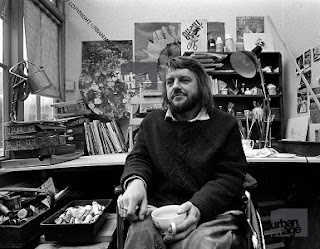Robert Wyatt's presence and importance to progressive rock is hard to overstate. His recording history began in 1968 and he was a founding member of Soft Machine. He is a multi-instrumentalist and includes drums, keyboards, and trumpet in his bag (obviously each of these requires different skills). While his singing doesn't sound impressive or virtuosic, he's able to convey so much emotion within a limited range of pitch and volume. Whenever I hear his distinctive voice, I take immediate notice.
Dondestan is essentially a solo album, but also a collaboration with Alfreda Benge, Wyatt's wife since 1974. She created the cover art, which I see as the two of them enjoying an oceanside view of the outside world. I thought at first that Dondestan was the name of the coastal village in the painting, but according to Wikipedia, "The title is a phonetic rendition of the Spanish expression "Donde están", i.e. "Where are they". Wyatt is obviously fluent in Spanish; his vocals on "Frontera," sung in Spanish and the first song on Phil Manzanera's Diamond Head album, is one of my favorite listening experiences.
Our review is of the original 1991 CD, not Dondestan (Revisited) from 1998, which I've never heard. Wyatt is credited with all sounds heard: voice, percussion, keyboards, and piano. Mostly the keyboards are electronic sounds that are processed to create glowing ambience to soften Wyatt's already understated vocals. The mood is wistful and nostalgic, bordering on sad. These are not dance tunes or rockers. Only "Shrinkwrap," "Left on Man," and the closing title track get into gear with a rhythmic backing for lyrics about hard work, hard times, post-colonial outrage, and a plea for recognizing the sovereignty of Palestine. The rest of the songs are like dreams, never fully revealing their meaning or seeking to impress.
Benge contributed the lyrics to five of the nine songs, and Wyatt wrote the rest save one. The legendary Hugh Hopper of Soft Machine fame earns a credit for writing the music to "Lisp Service."
My favorite moment on Dondestan is the beginning of "CP Jeebies." The sound of Wyatt's organ is so pure and reassuring following the troubling "Shrinkwrap." Wyatt adds piano and melodica in the foreground along with the gentle wash of backing keyboards. Beautiful song!
As a largely solo project, Dondestan offers a great opportunity to hear Wyatt's drumming. I'm tempted to consider drums his main axe but obviously he knows his way around the keyboards and the melodica on Dondestan.
There's a lot of prog history captured in Dondestan, one of Wyatt's and prog music's best moments.
Steve:
Robert Wyatt is one of the most original and most beloved elder statesmen of progressive rock. After appearing as a drummer and lead vocalist on Soft Machine's first four albums, he formed a similarly inclined group called Matching Mole which released two albums He also put out his first solo album, the freeform (and admittedly hard to get into) The End of An Ear. A crippling accident in 1973 left Wyatt paralyzed from the waist down, precipitating the next, very different phase of his career, which continues off and on to this day.
Wyatt's 1991 effort, Dondestan, remains one of his most enjoyable and most focused albums. Its predecessor, Old Rottenhat (1985), had a similar sound - based primarily on stately organ chords, with Wyatt's gentle tenor and lyrics reflecting Wyatt's leftist political stance. Dondestan features the same sounds but adds more live drums (mostly brushed cymbals and snare, as Wyatt was no longer able to play a full drum kit), and acoustic piano. Sometimes, as on the closing title track, the piano takes center stage, and the arrangement is much more staccato and fast-paced than is typical of the album. The odd "Shrinkrap" (which uses a backwards percussion track) takes a similar approach. Being a fan of weird sounds, this track stands out as a favorite of mine.
Most of the album, however, is calm and thoughtful. The opener "Costa" is another favorite, as it combines the slow, droning melody with a busy (yet quiet) underlying drum track and some simple but effective bass that gives the track additional range. Wyatt's next album, Shleep (1997), would continue to favor fuller arrangements and use outside musicians.
A beloved character whose integrity has never wavered an inch, Wyatt has made many friends from all walks of the pop/rock world, and to guest on one of his albums is worn as a badge of honor among his peers.






No comments:
Post a Comment